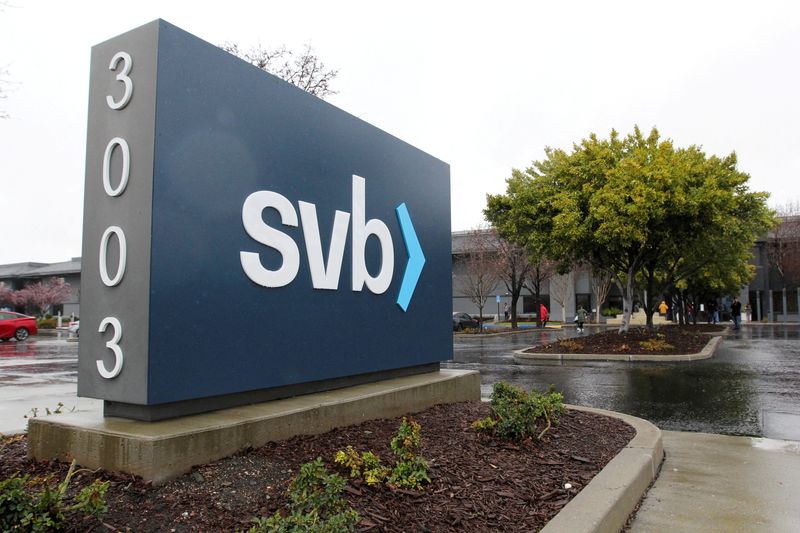By Nupur Anand
NEW YORK (Reuters) - Small business owners in the U.S. are struggling to get financing from traditional lenders as the impact of higher rates and bank failures of a year ago linger, holding back business growth for some.
The difficulty in getting more traditional forms of credit shows how sharp interest rate hikes by the U.S. Federal Reserve, exacerbated by the failures of Silicon Valley Bank and Signature Bank (OTC:SBNY) last March are reverberating in the economy, say analysts and other industry insiders.
Small businesses are key to the country’s economic health, with one study showing they account for 44% of US economic activity.
Over half a dozen small business owners contacted by Reuters in the last few weeks said they had found it harder to get traditional forms of credit such as loans from big, mid-size and small regional banks.
Some were wary of turning to non-traditional lenders like fintech firms or companies that provide financing based on prospective revenues, even though these were readily available. Small businesses typically go to mid- and small lenders for loans, said industry analysts.
These small businesses were spread across the country and included restaurants, non-profit entities, retail boutiques, online education firms and mom-and-pop stores.
"I have been turned down by several small to mid-sized banks," said Gerald Williams, a Sacramento, California-based entrepreneur who owns Beale Hot Sauce, who has been looking for a $50,000 loan since last March to grow his business. Williams said the lack of funding has cost him several opportunities to grow his business, including buying a commercial kitchen.
About 77% of small business owners are concerned about their ability to access capital and 28% of loan applicants said they had taken out a loan or line of credit with payment terms they felt were predatory, according to a survey by Goldman Sachs released in January which included nearly 1,500 small borrowers across the country.
"When banks tighten their underwriting criteria, it usually impacts low to moderate income communities more and they have been seeing a significant uptick in outreach from predatory lenders," said Carolina Martinez, CEO of CAMEO, California’s statewide micro-business network.
The Goldman survey also said Black-owned businesses were struggling even more for access to capital. It said 32% of Black-owned businesses that applied for loans secured one, compared to about 47% of white small business owners. In addition, 86% of Black-owned businesses were concerned about having access to capital.
BANK LENDING CONSTRAINED
In the past year banks have pulled back on lending to both consumers and businesses.
The Fed's quarterly Senior Loan Officer Opinion Survey released in January showed more banks tightening lending standards for small firms than loosening them, though not to the degree seen over the previous several quarters. Still, the net share of banks offering more stringent loan terms for smaller businesses was more than twice the historic average since 1990.
U.S. small business sentiment in January fell to its lowest since May 2023, as labor costs and slowing sales squeeze bottom lines, according to a report published by the National Federation of Independent Business last month. Small businesses have also been finding it difficult to access credit at a time when inflation has remained high.
Smaller and regional banks have continued to struggle with deposit growth in the past year, which in turn has prompted them to be cautious about lending, analysts say.
"A lot of (banks) are saying if you want to take a loan with us, you would also need to bank with us and that has been a challenge for the customers," said Timothy Coffey, an analyst at Janney Montgomery Scott, who said higher rates and recent bank failures affected loan originations.
"All of these factors have slowed down the loan origination process," Coffey said.
The Consumer Bankers Association, which represents several lenders, declined comment. The American Bankers Association, which also represents several banks, said multiple factors could be at play in the situation facing small businesses.
"Banks of all sizes are still the biggest lenders to small businesses, and the banking industry will continue to work to meet the credit needs of this critical sector of the U.S. economy," an ABA spokesperson said.
Small businesses have been forced to explore other options, said Rick Kuci, COO of FundKite, a small business funding platform which provides revenue-based financing.
"Our business has grown 20% in 2023 and this has come up in a lot of conversations with businesses who approach us that they are finding it difficult to get a loan from their primary bank that they have been banking with because their credit profile doesn't fit or for other reasons," said Kuci.
HAMPERING GROWTH
Tighter credit has curtailed growth at some small businesses.
Shantell Chambliss, a business owner based in Richmond, Virginia, said she has been hunting for a $25,000 loan since May and has been turned down by several lenders, forcing her to scale back her ambitions.
"What I had planned to achieve six months ago, I haven't even started with that due to funding constraints," she said.

She was able to borrow about $6,000 from a non-bank lenders that provide funding based on prospective revenues but does not want any more from them because of unsuitable terms, she said.
"The process of looking for a loan has been so frustrating that I have just given up on it," said Chambliss.